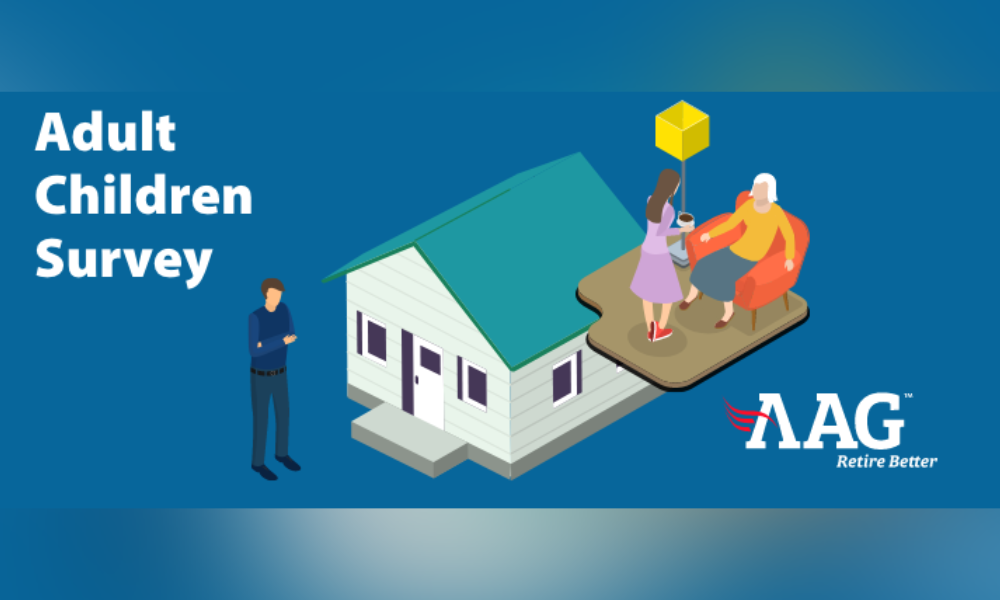Seniors are averse to tapping into equity despite $11 trillion in wealth

More than half of Generation X adult children don’t have enough money to help their senior parents who are already averse to tapping home equity for needed expenditures, according to a new study.
Inflation and current market conditions have created economic challenges for senior Baby Boomers, and new data from American Advisors Group (AAG) shows those same financial issues could become a problem for their Gen X children. To learn exactly how Gen X adult children are feeling about their parents’ financial state, AAG, a national leader in home equity solutions for seniors, conducted the Adult Children Survey with more than 1,500 participants aged 40-55 who have senior parents.
Senior housing wealth has reached a historic, record high of $11 trillion, according to the National Reverse Mortgage Lenders Association. Through a federally insured Home Equity Conversion Mortgage (HECM) loan, more commonly known as a reverse mortgage, seniors aged 62 and older can access their home equity, eliminate their monthly mortgage payments, and remain in their home long term. Seniors who use a reverse mortgage loan to remain in their home long term are required to continue paying their taxes and insurance, maintain the home, and comply with all terms of the loan.
Find out: Is a reverse mortgage a good idea for seniors?
The financial wherewithal for Gen Xers intent on helping their parents as they age appears limited. According to the study, more than half of Gen X adult children do not have enough money to help their senior parents. The study also found that 55% of adult children said they are not financially prepared to care for their parents in a time of need.
Read more: Seniors balk at using home equity loans
“We like to think of our parents as having all answers, especially with their finances,” Edward Herda, AAG vice president of brand strategy and creative marketing, told Mortgage Professional America. “However, times are changing, and for many seniors their home equity has become their greatest asset. So, educating seniors and their families on the benefits of tapping that built-up equity, and the various ways it can be used, is critical. An issue to still overcome is the general lack of understanding of how the product works and how it can be used to fund things like long-term care, medical bills, home renovations and so much more. We even have customers who have used reverse mortgages to purchase homes that better suit their lifestyles.”
The AAG study also found the majority of Gen X adult children are concerned that inflation is hurting their parents’ situation – 62% of adult children say they are worried about the impact that inflation is having on their parents’ finances. Moreover, more than a third of Gen X adult children are worried their parents’ financial issues will fall on them, and 35% of adult children say they are worried their parents will become a financial burden to them at some point.
Such worries are often existential: More than half of Gen X adult children are not able to afford any type of elder care for their parents, according to the findings. And 59% of adult children could not afford in-home nursing care, or care at an assisted living facility, for their parents.
“Many seniors seem to follow a financial strategy that may no longer work for their situation, and they may not view their home equity as a viable option,” Herda said. “The home, too, has always been considered a “last resort,” so folks aren’t incorporating what is likely their largest asset into the big picture. There are also many outdated misconceptions surrounding reverse mortgages—from both consumers and the financial planning industry; it’s important for families to do their research and figure out if a financial tool like a reverse mortgage is a good fit for their situation.”
Read next: How much home equity is being tapped by homeowners?
Yet for all their worries, Gen Xers have a tenuous grasp of their parents’ finances, the study found. A full half of Gen X adult children in the US do not know how much debt their parents have amassed, researchers found. Fifty per cent (50%) of adult children said they are not aware of how much debt their parents currently have, the study found.
What’s more, over three-fourths of parents have never spoken to their Gen X children about using their home equity, according to the survey. The study found that 76% of adult children said they have never discussed utilizing their home equity to fund their retirement years.
Still, most Gen X adult children believe that their parents’ home equity could be a financial solution, according to the findings. The study showed that 60% of adult children said they are in favor of their parents using their home equity to fund their later years.
“It was eye-opening to see that the majority of Gen X adult children now support their parents tapping home equity,” Herda told MPA. “It shows that the changes made to the reverse mortgage program over the last 10 years have made a significant impact and it further validates the positive customer stories we see and hear every day.”
Herda said seniors should know about the safety of financing options and be aware of bolstered regulation to ensure further safeguards: “It’s important for families to realize that a Home Equity Conversion Mortgage (HECM), or a reverse mortgage as it’s more commonly known, is an FHA-insured loan that was designed to help seniors afford their retirement years,” he said. “Since 2013, continual changes have been made to the program to bolster consumer protections, such as required counseling from a third-party HUD-approved counselor, completion of a financial assessment, provisions for non-borrowing spouses, and additions like the Life Expectancy Set Aside (LESA) to help ensure that expenses like taxes and insurance are accounted for.”
AAG’s Adult Children Survey was conducted in May, and included 1,510 participants.



